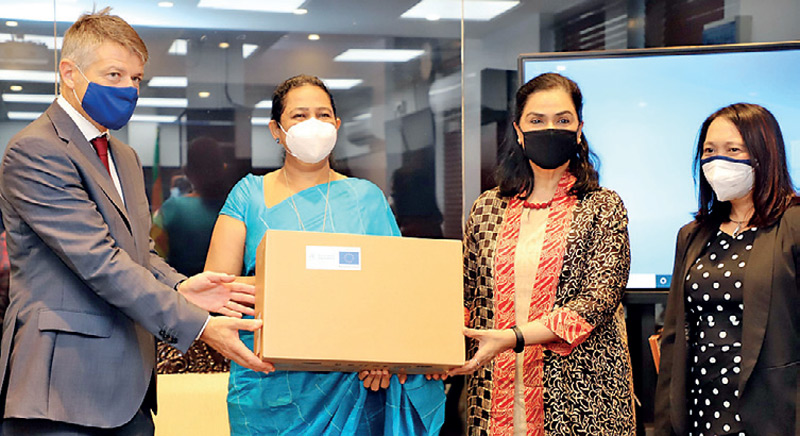Wednesday Feb 25, 2026
Wednesday Feb 25, 2026
Friday, 13 August 2021 03:29 - - {{hitsCtrl.values.hits}}

Critical emergency medical equipment has been made available to 78 hospitals across the country for the COVID-19 response through a partnership between the World Health Organization (WHO) and the European Union (EU). These include high dependency unit (HDU) beds, finger pulse oximeters, oxygen concentrators, oxygen jumbo cylinders, and other urgent supplies.
The supplies are part of a EUR 2 million EU grant provided to WHO for support to strengthen emergency response capacities in Sri Lanka. The funding has been made available on flexible terms to allow for responsiveness to country needs as demonstrated by this EUR 480,000 procurement of urgently needed supplies for COVID-19 case management. As a comprehensive approach to case management, the EU grant is also being used to strengthen health worker capacities. Based on the potential of e-learning as highlighted during the COVID-19 experience and with technical support from WHO, the Ministry of Health (MoH) has established a virtual learning management information system (LMIS). The LMIS has enhanced all 43 MoH training centres, already reaching more than 12,000 health workers currently undergoing training and shall reach an additional 5,000 new recruits every year. Further, WHO’s global learning networks will be used to facilitate access to resources for Sri Lankan healthcare workers as well as enable Sri Lankan courses to be shared worldwide.
The WHO-EU collaboration also supports key community-centred activities for resilient health systems including risk communication and, notably, mental health and psychosocial wellbeing.
Ambassador of the Delegation of the European Union to Sri Lanka and the Maldives Denis Chaibi said, “I’m very pleased that EU funding has been reallocated to address critical needs arising from the latest wave of infections in Sri Lanka. The EU and the WHO are working together to ensure that our support can rapidly assist people affected in order to help address the spread of the disease.”
WHO Representative to Sri Lanka Dr. Alaka Singh stated, “WHO appreciates the European Union’s partnership for collaborative support to Sri Lanka’s COVID-19 effort. Particularly notable is the flexibility of EU funding that allows responsiveness to immediate country needs during this unpredictable pandemic. This has been seen with the supply of urgent life-saving equipment to hospitals across the country. At the same time, longer-term support continues, making important contributions to strengthening resilience in Sri Lanka’s health system.”